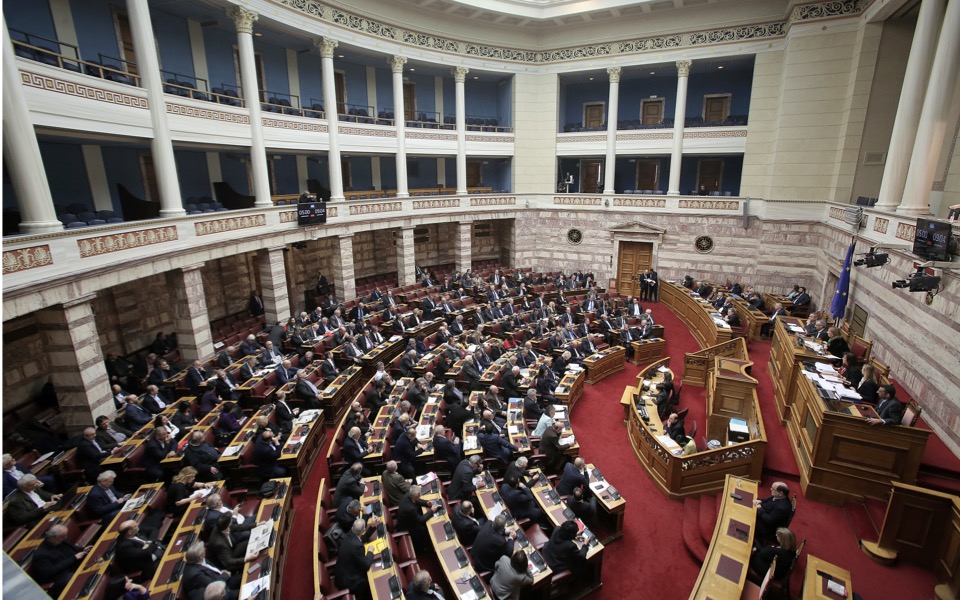Sober debate could restore trust in politics

It is the inalienable right of every citizen to shape and hold his own opinion on issues of historical significance without separating Greeks into traitors and patriots. Division must be avoided at all cost. Particularly, Greeks must not be divided for the wrong reasons or on the basis of groundless arguments.
As the parliamentary debate continues against a backdrop of intense polarization, I can only wish that the discussion takes place in a sober and responsible manner. The people (who need clarity and not pseudo-arguments driven by political expediency) and the House (on which the fate of the name deal ultimately hangs) must both be informed. Deputies can then vote according to their personal conscience as the Constitution mandates – or, at least, allows for – on major national issues.
Rather than subjecting reason to myopic, partisan concerns, we must subject politics to reason. We must make sure that an undistracted debate is held on the issue and that it does not get hijacked by narrow partisan tactics driven by the apparent popular majority against the deal.
If all parties were to enable their MPs to cast a conscience vote, it would upgrade the quality of the debate and reduce political transfers between parties. Party discipline and political expediency undermine the status of the House and the quality of our democracy. Lawmakers cannot be expected to vote on major national issues on the basis of party lines. National issues cannot be subjected to political circumstance.
There is legitimate criticism to be made against the Prespes agreement. Some critics, for example, oppose the deal because they are against any settlement that includes the word “Macedonia” with a qualifier.
Other arguments are more suspicious, however, amounting to little but catchy slogans that fail the test of reason. That the Prespes deal “gives away ethnicity” is one such argument. It is an erroneous claim. The deal designates citizenship, not ethnicity. Criticism is aimed at opening holes in the opponent’s defense.
Another misguided claim is that “it recognizes Macedonian language and history” (I will in fact improve on this line of criticism by adding that nation = same blood, same religion and same language; thereby, the argument goes, by recognizing language and history you also recognize the nation). The argument is inaccurate as far as the language is concerned.
A Macedonian language has been “recognized” internationally for decades. The Prespes deal corrects reality, as it were, by clarifying that the language in question is not that used by Alexander the Great (the point after all was to eradicate traces of historical revisionism).
As far as history is concerned, the treaty does not regulate the history of the Balkan country (this would not be possible anyway). It does, however, oblige it to remove all symbols of historical irredentism. So saying that the Prespes deal recognizes language, history and (as a result) nation has one serious problem: It’s wrong.
There is, on the other hand, an issue on which everyone should insist: the issue of citizenship. The deal does not stipulate “Macedonian” but rather “Macedonian/citizen of North Macedonia.” I have previously argued that the proper interpretation of this evident compromise solution (which can be criticized for failing to secure the designation “North Macedonian”) is that it must be used in full. I believe that this is best for our national interests. This is also because the designation “citizen of North Macedonia” also includes the country’s ethnic Albanians.
Critics say that by ratifying the deal, Athens is ceding to the people of the neighboring state the right to call themselves “Macedonian.” Such criticism does not serve Greece’s cause. We must, in my opinion, avoid insisting on this.
The question of a “North Macedonian” nation lies – as it always has – outside the contours of the Prespes deal. It could not be otherwise, because the nation exceeds the boundaries of the state and is not the subject of international law. That said, the deal does not generate fresh arguments regarding the recognition (or not) of a “Macedonian” minority.
On the contrary, it must be pointed out that the clarification offered by the Prespes agreement will help Greece on a legal level to avoid future sanctions by the European Court of Human Rights – such as the case of Sidiropoulos and Others vs Greece (1998) and the Macedonian House of Civilization vs Greece (2015). Had Greece’s refusal at the time been grounded on an agreement like the Prespes accord, the European court would not have ruled against the country.
Are there aspects of the deal which are problematic? There certainly are, but they have not been part of the public debate. For example, a thorny issue that will require caution if the deal is ratified is the issue of signs.
Meanwhile, there is speculation that begets concern. According to one scenario, after joining NATO as the “Republic of North Macedonia,” the country could switch its name back to “Macedonia.” The question here is will Greece be better safeguarded by ratifying the Prespes agreement? The answer is that the deal will provide better legal and political protection (weak states cannot afford to be deceitful).
I say let the perils and the gains stemming from the Prespes deal be discussed in a sober fashion. And let the deal be the subject of a civilized confrontation – and not the excuse for a foul-mouthed quarrel. Doing so will benefit our democracy and reinforce people’s trust in politics (which has been seriously undermined).
Given the fact that history will be the ultimate judge, we must keep in mind that history will also be shaped by our positions and national vigor.
Haris Pamboukis was minister of state from 2009 to 2011. He has also served as deputy development minister.





